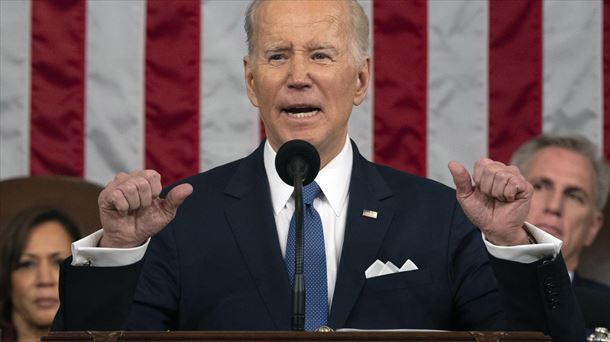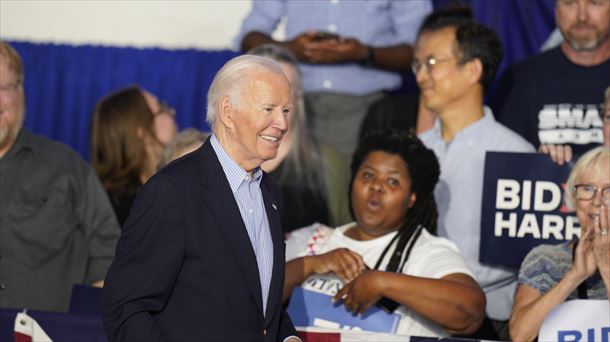Primary proceedings begin this Tuesday and Johnson’s successor is expected to be named before September 5, when the next parliamentary course begins
Boris Johnson on Monday refused to identify his favorite from the pool of candidates to replace him as Conservative Party leader and UK Prime Minister in the selection process that officially kicks off this Tuesday. “I don’t want to harm anyone’s prospects by offering my support,” he said in his first public appearance since he was forced to resign as leader last week. The acting president, who visited a scientific research center in London, instead expressed his full confidence in the government program that his successor will inherit. “He has a great agenda to move forward,” he told media, citing infrastructure, technology and regional equality, among other props of his 2019 manifesto.
Johnson fell midway through his first term due to leadership failure and a radical departure from the trajectory or political strategy of the next Executive, who should have been formed in mid- or late September, is not expected. “The main change with the next prime minister will be one of style, but there will be no different policy,” British political professor and expert Vernon Bogdanor said during a meeting Monday with members of the Foreign Press Association (FPA).
The same premise was adopted by the candidates in their first election messages. “In the next leader, we look for integrity even before we go into politics,” said Sajid Javid, the first senior minister to leave Johnson’s cabinet despite the curtain of lies Downing Street has tried to hide from every crisis in recent years. nine months, from the “party gate” to protecting corrupt deputies and promoting an apparent sexual predator. “We need a leader who can show leadership, make credible promises, unite people and make tough decisions in the national interest,” added the former head of Health and Economy.
Professor Bogdanor, for his part, regrets that the head of government the UK needs will not emerge from the Tory primaries at this stage of geopolitical uncertainty and global economic downturn. “We need a leader who is able to tell the public unpopular truths, such as the reality that living standards will deteriorate, but that leader may not win the election,” he said at FPA headquarters.
Cutting taxes and increasing defense spending are two pledges echoed in most candidates’ manifestos, though none have indicated whether they will choose to expand debt to fund the gap. Nor have they identified the services they are willing to cut to clean up the economy of state waste during the coronavirus pandemic. Only the outgoing finance minister, Rishi Sunak, warned when he launched his candidacy that the electorate no longer believes in “fairy tales” and that it is essential to act with prudence and fiscal discipline. “Politicians and the media underestimate voter intelligence and common sense,” Bogdanor agrees.
The King’s College London researcher believes the ten candidates declared so far offer “slight differences in the details but not in the principles” on fundamental issues such as the relationship with the EU or the return to Brexit. “The UK will not return to any kind of liberal internationalism either,” he noted.
The academic rejects ideology as a distinguishing feature of the conservative party, which he defines as a “realistic and resilient” force, as well as “ruthless in getting rid of failing leaders” and highly adaptable to temporary trends. He believes Johnson has “acted correctly” by continuing as acting head of government, although some Tories continue to demand his immediate withdrawal from Downing Street and his replacement with an interim. Bogdanor eventually turns to Orwell to describe his country: “Britain is a family with the wrong members in charge.”
The deadline to present the nominations closes on Tuesday afternoon the 12th and the first round of voting begins the following day. There will be new voting sessions until the list of candidates for two finalists has been screened. The final decision rests with the estimated 200,000 party members who will be allowed to speak in the election of the conservative leader and prime minister.
The 1922 commission, which governs the process, agreed to raise the aid ceiling to 20 deputies per candidate, compared to the usual rule of eight required in previous elections. This is intended to speed up the processing of the primary, which ran for six weeks in Johnson’s election, although he was the clear favorite. His replacement could be announced in time for the resumption of the parliamentary course on September 5.
Source: La Verdad
I am an experienced and passionate journalist with a strong track record in news website reporting. I specialize in technology coverage, breaking stories on the latest developments and trends from around the world. Working for Today Times Live has given me the opportunity to write thought-provoking pieces that have caught the attention of many readers.



